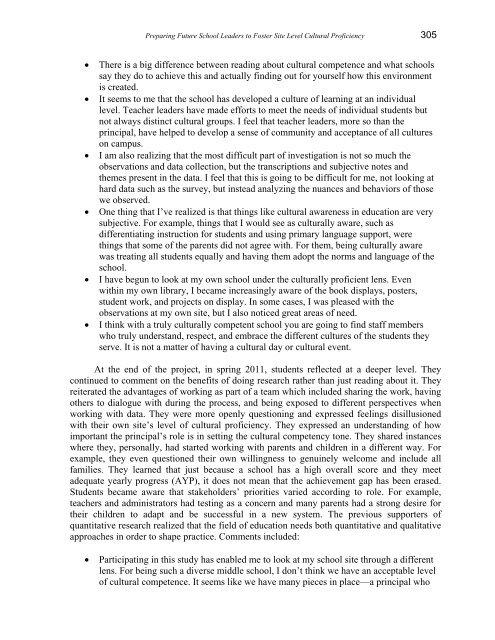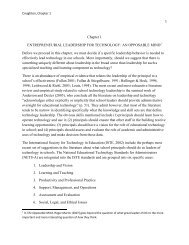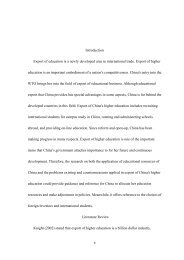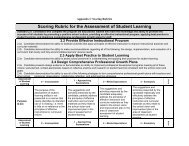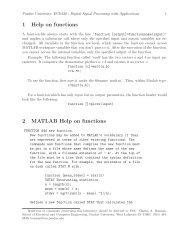Blazing New Trails - Connexions
Blazing New Trails - Connexions
Blazing New Trails - Connexions
You also want an ePaper? Increase the reach of your titles
YUMPU automatically turns print PDFs into web optimized ePapers that Google loves.
Preparing Future School Leaders to Foster Site Level Cultural Proficiency 305<br />
There is a big difference between reading about cultural competence and what schools<br />
say they do to achieve this and actually finding out for yourself how this environment<br />
is created.<br />
It seems to me that the school has developed a culture of learning at an individual<br />
level. Teacher leaders have made efforts to meet the needs of individual students but<br />
not always distinct cultural groups. I feel that teacher leaders, more so than the<br />
principal, have helped to develop a sense of community and acceptance of all cultures<br />
on campus.<br />
I am also realizing that the most difficult part of investigation is not so much the<br />
observations and data collection, but the transcriptions and subjective notes and<br />
themes present in the data. I feel that this is going to be difficult for me, not looking at<br />
hard data such as the survey, but instead analyzing the nuances and behaviors of those<br />
we observed.<br />
One thing that I’ve realized is that things like cultural awareness in education are very<br />
subjective. For example, things that I would see as culturally aware, such as<br />
differentiating instruction for students and using primary language support, were<br />
things that some of the parents did not agree with. For them, being culturally aware<br />
was treating all students equally and having them adopt the norms and language of the<br />
school.<br />
I have begun to look at my own school under the culturally proficient lens. Even<br />
within my own library, I became increasingly aware of the book displays, posters,<br />
student work, and projects on display. In some cases, I was pleased with the<br />
observations at my own site, but I also noticed great areas of need.<br />
I think with a truly culturally competent school you are going to find staff members<br />
who truly understand, respect, and embrace the different cultures of the students they<br />
serve. It is not a matter of having a cultural day or cultural event.<br />
At the end of the project, in spring 2011, students reflected at a deeper level. They<br />
continued to comment on the benefits of doing research rather than just reading about it. They<br />
reiterated the advantages of working as part of a team which included sharing the work, having<br />
others to dialogue with during the process, and being exposed to different perspectives when<br />
working with data. They were more openly questioning and expressed feelings disillusioned<br />
with their own site’s level of cultural proficiency. They expressed an understanding of how<br />
important the principal’s role is in setting the cultural competency tone. They shared instances<br />
where they, personally, had started working with parents and children in a different way. For<br />
example, they even questioned their own willingness to genuinely welcome and include all<br />
families. They learned that just because a school has a high overall score and they meet<br />
adequate yearly progress (AYP), it does not mean that the achievement gap has been erased.<br />
Students became aware that stakeholders’ priorities varied according to role. For example,<br />
teachers and administrators had testing as a concern and many parents had a strong desire for<br />
their children to adapt and be successful in a new system. The previous supporters of<br />
quantitative research realized that the field of education needs both quantitative and qualitative<br />
approaches in order to shape practice. Comments included:<br />
Participating in this study has enabled me to look at my school site through a different<br />
lens. For being such a diverse middle school, I don’t think we have an acceptable level<br />
of cultural competence. It seems like we have many pieces in place—a principal who


